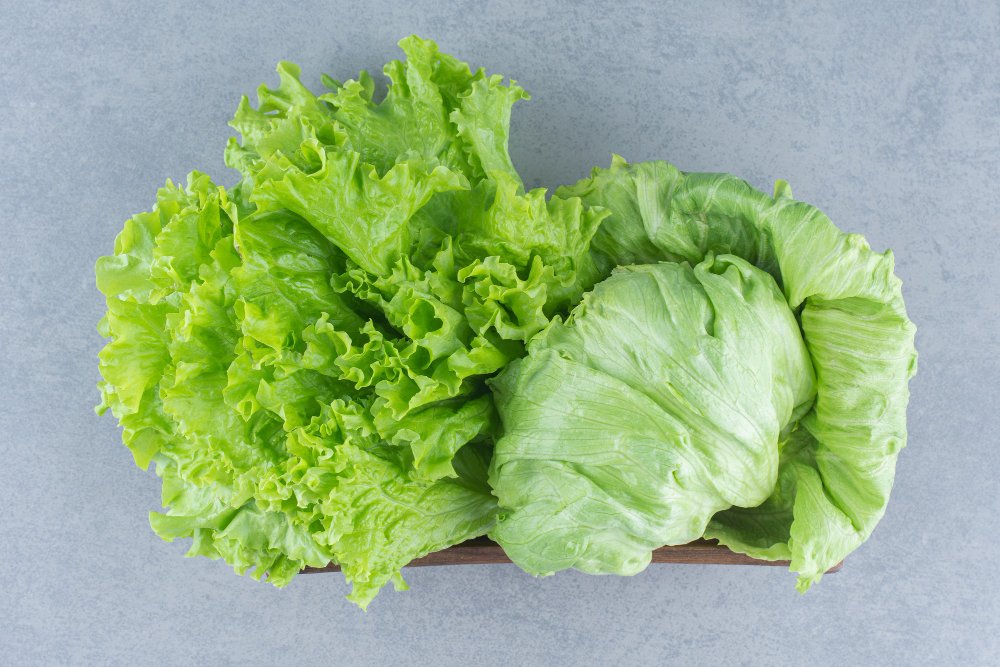
Lettuce: A Crispy and Nutrient-Rich Green
Description: Lettuce is a leafy green vegetable that is widely used in salads, sandwiches, and wraps. It comes in various types, each with its own texture, flavor, and nutritional profile. Common types include iceberg, romaine, butterhead, and leaf lettuce.
Cultivation:
- Soil: Well-draining soil rich in organic matter.
- Watering: Keep soil consistently moist; lettuce prefers evenly moist conditions.
- Sunlight: Full sun to partial shade, especially in hotter climates.
- Temperature: Lettuce thrives in cool temperatures; it can be grown in spring or fall.

Harvesting:
- Harvest leaves when they reach the desired size. Cut outer leaves or harvest the entire head, depending on the type of lettuce.
Nutritional Benefits:
- Low in calories and high in water content.
- Rich in vitamins A and K.
- Contains folate, iron, and antioxidants.
Culinary Uses:
- Salads: A staple ingredient in various salads.
- Sandwiches: Adds a crisp and refreshing element to sandwiches.
- Wraps: Used in wraps and tacos for added texture and flavor.
Growing Lettuce in Pots:
- Use well-draining potting mix.
- Plant seeds or seedlings in containers with adequate drainage.
- Water consistently to keep the soil evenly moist.
- Place pots in a location with sufficient sunlight.
Lettuce: A Crisp and Nutrient-Rich Addition to Your Diet
Health Benefits:
- Low in Calories:
- Lettuce is low in calories, making it an excellent choice for those looking to manage their weight or reduce calorie intake.
- Rich in Vitamins and Minerals:
- Contains vitamins A, K, and C, essential for vision, bone health, and immune function.
- Hydration:
- With its high water content, lettuce contributes to hydration, supporting overall bodily functions.
- Antioxidant Properties:
- Provides antioxidants that help combat oxidative stress and may contribute to overall health.
- Heart Health:
- The fiber content in lettuce can aid in maintaining healthy cholesterol levels, supporting cardiovascular health.
- Digestive Health:
- The fiber in lettuce supports digestion and helps prevent constipation.
- Low Glycemic Index:
- Suitable for individuals managing blood sugar levels due to its low glycemic index.
- Weight Management:
- Incorporating lettuce into meals can promote satiety and support weight management.
- Bone Health:
- Rich in vitamin K, lettuce contributes to bone health by aiding in calcium absorption.
- Skin Health:
- The vitamins and antioxidants in lettuce may contribute to healthy skin and a youthful appearance.
- Detoxification:
- Lettuce’s water content, along with its nutrient profile, supports natural detoxification processes in the body.
Culinary Uses:
- Salads:
- A staple in various salads, providing freshness and a crisp texture.
- Sandwiches and Wraps:
- Adds crunch and a nutritional boost to sandwiches and wraps.
- Smoothies:
- Blending lettuce into smoothies is a creative way to incorporate its benefits into your diet.
Note: While lettuce offers numerous health benefits, it’s essential to maintain a balanced diet that includes a variety of fruits and vegetables. Consulting with a healthcare professional or nutritionist can provide personalized advice based on individual health needs.




